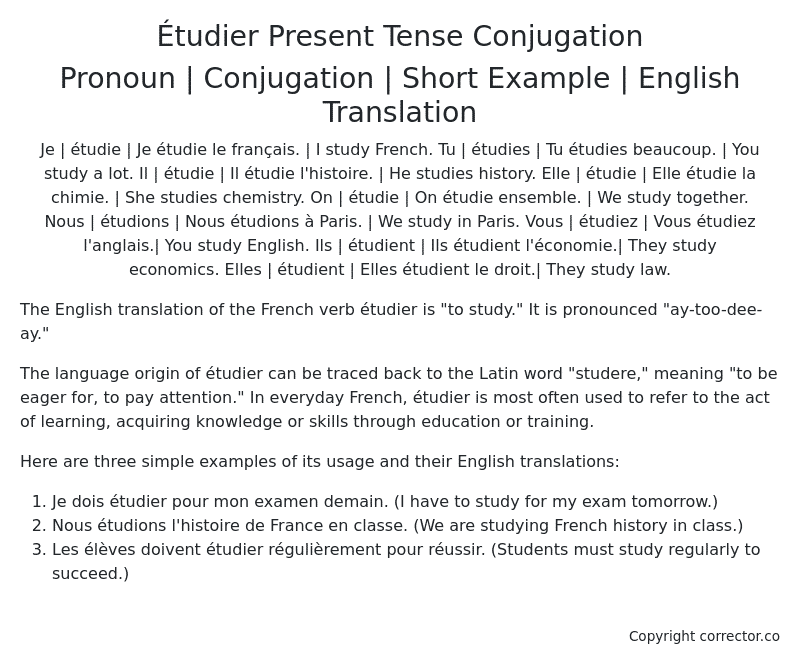Le Present (Present Tense) Conjugation of the French Verb étudier
Introduction to the verb étudier
The English translation of the French verb étudier is “to study.” It is pronounced “ay-too-dee-ay.”
The language origin of étudier can be traced back to the Latin word “studere,” meaning “to be eager for, to pay attention.” In everyday French, étudier is most often used to refer to the act of learning, acquiring knowledge or skills through education or training.
Here are three simple examples of its usage and their English translations:
- Je dois étudier pour mon examen demain. (I have to study for my exam tomorrow.)
- Nous étudions l’histoire de France en classe. (We are studying French history in class.)
- Les élèves doivent étudier régulièrement pour réussir. (Students must study regularly to succeed.)
Étudier – About the French Present Tense
To take a deep dive into all the French tenses then see our article on Mastering French Tense Conjugation.
Common Everyday Usage Patterns For Le Present
Interactions with Other Tenses
Table of the Present Tense Conjugation of étudier
Pronoun | Conjugation | Short Example | English Translation
Je | étudie | Je étudie le français. | I study French.
Tu | étudies | Tu étudies beaucoup. | You study a lot.
Il | étudie | Il étudie l’histoire. | He studies history.
Elle | étudie | Elle étudie la chimie. | She studies chemistry.
On | étudie | On étudie ensemble. | We study together.
Nous | étudions | Nous étudions à Paris. | We study in Paris.
Vous | étudiez | Vous étudiez l’anglais.| You study English.
Ils | étudient | Ils étudient l’économie.| They study economics.
Elles | étudient | Elles étudient le droit.| They study law.
Other Conjugations for Étudier.
Le Present (Present Tense) Conjugation of the French Verb étudier (this article)
Imparfait (Imperfect) Tense Conjugation of the French Verb étudier
Passé Simple (Simple Past) Tense Conjugation of the French Verb étudier
Passé Composé (Present Perfect) Tense Conjugation of the French Verb étudier
Futur Simple (Simple Future) Tense Conjugation of the French Verb étudier
Futur Proche (Near Future) Tense Conjugation of the French Verb étudier
Plus-que-parfait (Pluperfect) Tense Conjugation of the French Verb étudier
Passé Antérieur (Past Anterior) Tense Conjugation of the French Verb étudier
Futur Antérieur (Future Anterior) Tense Conjugation of the French Verb étudier
Subjonctif Présent (Subjunctive Present) Tense Conjugation of the French Verb étudier
Subjonctif Passé (Subjunctive Past) Tense Conjugation of the French Verb étudier
Subjonctif Imparfait (Subjunctive Imperfect) Tense Conjugation of the French Verb étudier
Subjonctif Plus-que-parfait (Subjunctive Pluperfect) Tense Conjugation of the French Verb étudier
Conditionnel Présent (Conditional Present) Tense Conjugation of the French Verb étudier
Conditionnel Passé (Conditional Past) Tense Conjugation of the French Verb étudier
L’impératif Présent (Imperative Present) Tense Conjugation of the French Verb étudier
L’infinitif Présent (Infinitive Present) Tense Conjugation of the French Verb étudier
Struggling with French verbs or the language in general? Why not use our free French Grammar Checker – no registration required!
Get a FREE Download Study Sheet of this Conjugation 🔥
Simply right click the image below, click “save image” and get your free reference for the étudier Present Tense tense conjugation!

I hope you enjoyed this article on the verb étudier. Still in a learning mood? Check out another TOTALLY random French verb present conjugation!


